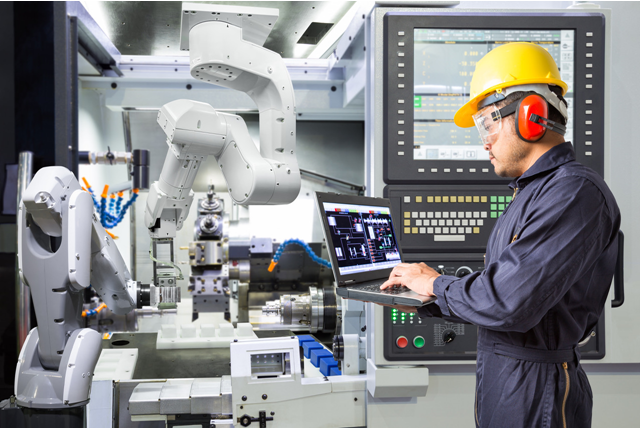
We will not achieve net zero by 2050 if we only bet on replacing fossil energy with renewables. A far bigger focus is needed on electrification and manufacturing technologies which allow industry to use massively less energy and resources. Just as much ‘clean tech’ as wind turbines and solar panels, these enabling technologies are not only vital for a realistic path to net zero, but will at the same time unlock exciting new growth opportunities across industrial sectors.
The global race to lead the clean tech revolution is on, and Europe is off and running. With its new industrial strategy and proposed Net Zero Industry Act, the EU has signalled its determination to accelerate down the path to net zero and its intention to throw unprecedented weight behind the manufacturing of key technologies for decarbonising the energy system, like wind turbines, solar panels, heat pumps, batteries and grid technologies.
All of which is good news. But scaling up renewables, however fast, will still see us face clean energy supply bottlenecks in the near term. Electricity currently accounts for only around a third of the European industry energy mix. Electrification of our economy and society will lead to a major increase in electricity demand – at a faster pace than the electricity supply can be decarbonised.
Energy efficiency technologies are central to reconciling these opposing dynamics: making our energy systems smarter and more flexible to deal with renewables, and massively increasing efficiency across industry, transport and buildings – so that we can do more with less. The IEA calls energy efficiency the ‘first fuel’ of energy transitions and estimates that more than 40% of decarbonisation needs to come from efficiency gains by 2040.
UNSUNG HEROES OF THE NET ZERO TRANSFORMATION
Recognising the full scope of the technologies needed for net zero is clearly key, especially at a time when the tendency for public sector intervention and planification is higher than ever.
As the Net Zero Industry Act defines them, net zero technologies encompass, besides renewable energy technologies, also electricity and heat storage, and energy-system related energy efficiency technologies. While these are crucial, we believe work is needed beyond the energy system alone: a radical agenda to take advantage of energy efficiency as the first fuel depends on ramping up all technologies which raise resource and operational efficiency.
At Orgalim, which represents Europe’s technology industries, we have numerous case studies that demonstrate just how transformative these broader efficiency technologies are, and how they work. They show, for example, how digitalising and collecting all data in a factory enables optimisation of processes and predictive maintenance to achieve significant energy, resource and productivity gains; how AI-enhanced automation of quality control processes reduces materials wastage; and how energy management systems work to cut electricity demand in the transport sector.
TAKING THE BRAKES OFF
All these technologies are delivering results already today and European companies are leaders in many of them. So what is holding us back from scaling them up more widely?
Orgalim’s latest economic outlook report gives an indication. At a time when massive investment is needed to scale up the deployment of these proven solutions, real investment in our technology industries – representing a third of European industry – is declining, in the face of considerable competitiveness and structural challenges.
To accelerate the transition, attention to improving the underlying private investment conditions in Europe is urgently needed. The EU’s competitiveness strategy must address the structural issues confronting our companies, not least the cost pressures related to energy, labour and regulatory burdens. As European Commission President Ursula von der Leyen said, when announcing the Net Zero Industry Act: “We need a regulatory environment that allows us to scale up the clean energy transition quickly.”
Here at Orgalim, we could not agree more. Europe’s net zero industry is electrifying and revved up. Let’s take the brakes off.
Recommended links:
-
EU needs a more comprehensive industrial plan to secure competitiveness in the net zero age
-
Securing Europe’s industrial competitiveness – An agenda to recommit to the Single Market
-
EU 'net-zero' Industrial Plan must leverage the full power of the market to succeed
About the author:
Malte Lohan is the Director General of Orgalim, Europe’s Technology Industries, speaking for innovative companies spanning the mechanical and electrical engineering, electronics, ICT and metal technology branches. Together they represent the EU’s largest manufacturing sector, generating annual turnover of nearly €3,000 billion, manufacturing one-third of all European exports and providing over 11 million direct jobs. He is responsible for setting Orgalim’s strategy, acting as the senior representative of the European technology industries in Brussels and managing the operations of the association.
Disclaimer: This article is a contribution from a partner. All rights reserved.
Neither the European Commission nor any person acting on behalf of the Commission is responsible for the use that might be made of the information in the article. The opinions expressed are those of the author(s) only and should not be considered as representative of the European Commission’s official position.
RELATED ARTICLES:
➔ If we really want to put energy efficiency first, here’s how
➔ Revised Energy Efficiency Directive: New rules, more savings, higher benefits.
➔ From fringe to mainstream: the opportunities (and risks) of a thriving community energy movement
Details
- Publication date
- 2 June 2023
- Author
- European Climate, Infrastructure and Environment Executive Agency
